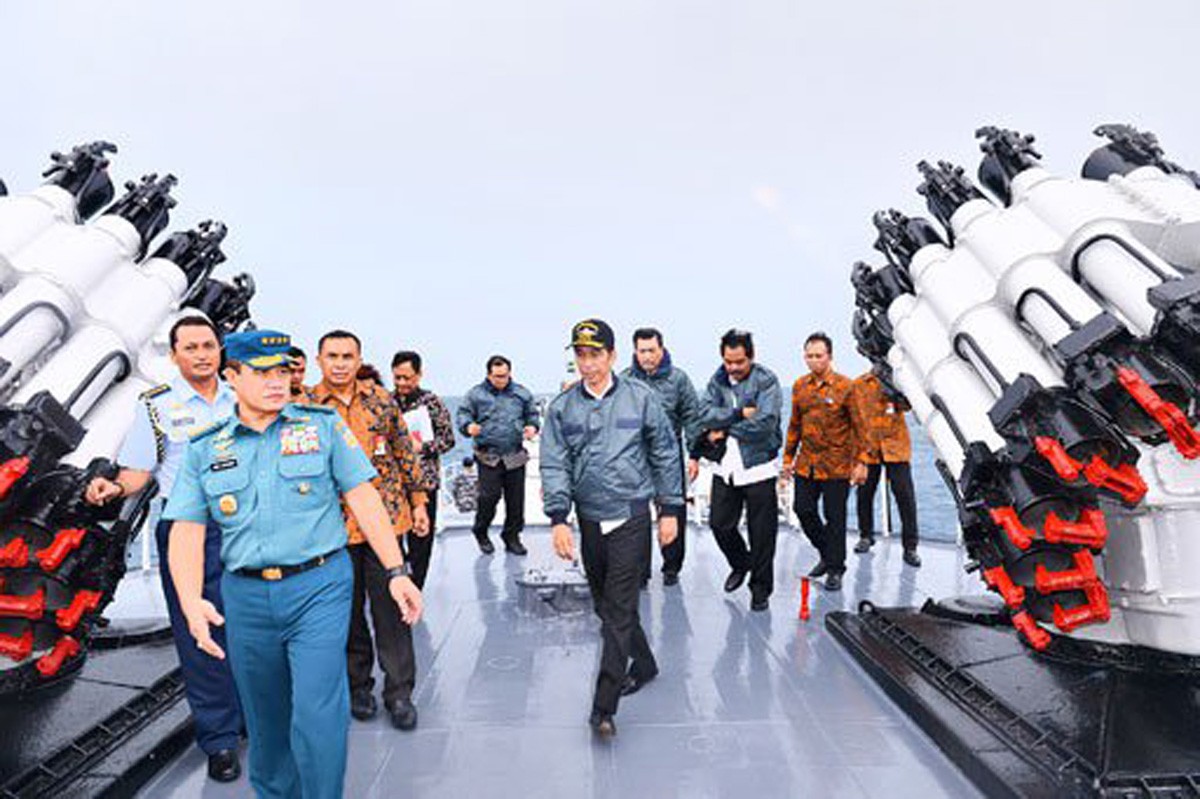Rule of law ‘common denominator’ in maritime security
Rule of law ‘common denominator’ in maritime security

President Joko “Jokowi” Widodo (center), accompanied by Navy chief of staff Adm. Ade Supandi (left) and other senior officials, inspects the warship KRI Imam Bonjol 383 after a Cabinet meeting onboard in the Natuna waters, Riau Islands, on June 23.(Courtesy of Setpres/Krishadiyanto
The rule of law will keep the playing field level when it comes to debating maritime security in an Asia-Pacific region charged with competing interests, international maritime law experts argue.
As Asia is increasingly becoming the center of global economic growth, the region’s existing maritime security architecture needs to be improved, says Arief Havas Oegroseno, assistant for maritime security at the Office of the Coordinating Maritime Affairs Minister.
Balancing between traditional and non-traditional security threats, domestic factors, the need for operational-level arrangements and the undeniable influence of Sino-American relations on the region, Havas argued that regional policymakers at the highest levels needed to keep the playing field level, or risk seeing regional tensions escalate.
“[We have] all these elements in the larger picture of what I call the ‘Paradox of Asia’: On the one hand, Asia has tremendous economic development, [...] but in strategic and security issues sometimes our behavior is still [stuck in the] 19th century,” he said in a keynote speech at an international maritime security symposium in Jakarta.
One of the best solutions that countries in the region can rely on regardless of their economic, political and demographic standing, is the rule of law, Havas added. “Going back to the law is very important because we have a common reference of what it is in terms of the conduct of countries in the region.”
This assertion was supported by Robert Beckman, professor at the Centre for International Law at the National University of Singapore.
“The Law of the Sea is critically important to protect the interests of the coastal states in the region,” said Beckman, referring to the 1982 UN Convention on the Law of the Sea.
He did, however, point out that relying on the general principles of international law alone would not suffice and that more rules of engagement were needed to encompass all the outstanding issues in the region.
“If we talk about maritime security issues, we must talk about where the actual events are, whether in territorial seas, straits, archipelagic waters or economic zones, but in many other respects, maritime security issues are not handled in any detail in UNCLOS,” he said.
Beckman said most countries in Southeast Asia, or at least all the countries surrounding the South China Sea, were parties to UNCLOS, with the exception of North Korea and Cambodia.
Beckman also shone a light on the US, which has yet to ratify the convention. With regard to this, Havas urged the US to ratify UNCLOS “as soon as possible” to maintain credibility and engagement in the region.
For Southeast Asia, at least in Indonesia’s perspective, UNCLOS has been pivotal for maintaining peace, stability and allowing countries to prosper economically, especially as regards the South China Sea issue.
A recent international tribunal ruling has provided a buffer against China’s expansionist claims in the sea, allowing smaller countries with competing claims like the Philippines to negotiate on an equal standing with the East Asian giant.
The ruling, based on the principles of UNCLOS, dismantled Beijing’s controversial nine-dash line, the basis for its unitary claim over features in the South China Sea.
Beijing rejected the ruling and its application, but the Indonesian Foreign Ministry’s leading legal expert, Damos Dumoli Agusman, argued that the decision remained valid even without China’s political support, although it was still up to the claimants to resolve the core issue.
Besides the Philippines, Malaysia, Brunei Darussalam and Vietnam also have competing claims with China and Taiwan in the disputed body of water, through which US$5 trillion of global trade passes each year.
Source : http://www.thejakartapost.com/news/2016/08/23/rule-of-law-common-denominator-in-maritime-security.html
- By admin
- 23 Aug 2016
- 1763
- INSA




